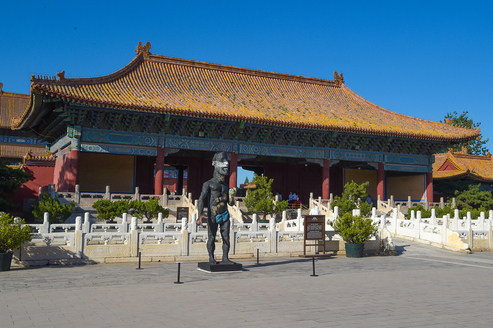
R
E
V N
E
X
T
As a follow-up to the 2015 exhibition “China 8,” which showcased contemporary art from China in nine museums in Germany’s Ruhr Valley, the organizers—Bonn’s Foundation for Art and Culture and Beijing’s Central Academy of Fine Arts (CAFA)—have partnered once again to mount the exhibition “Deutschland 8: German Art in China” in Beijing. However, days after the show opened in the Chinese capital, several artists whose works are part of the exhibition have voiced their discontent over German arms manufacturer Rheinmetall’s involvement as a sponsor.
Designed as “an art expedition into a foreign country,” or a conduit for intercultural dialogue between China and Germany, “Deutschland 8” is a presentation across seven venues, each taking a turn to highlight the historical context and developments in German art from 1945 to the present. As soon as several participating artists learned that the organizers have secured financial support from Rheinmetall, they voiced concerns over their creations being used to “[enhance] the image of such corporations.”
From left to right: Fan Di’an, president of the Central Academy of Fine Arts, Beijing; Sigmar Gabriel, German federal minister for foreign affairs; Walter Smerling, co-curator and chairman of the Foundation for Art and Culture, Bonn. Courtesy Foundation for Art and Culture, Bonn.
Soon after the show opened in Beijing on September 17, six of the 55 participating artists—Antje Ehmann, Marcel Odenbach, Julian Rosefeldt, Hito Steyerl, Rosemarie Trockel, Clemens von Wedemeyer—as well as the estate of Harun Farocki, wrote to co-curator Walter Smerling in protest. The demurring artists allege that subsidiaries of the company, which manufacture tanks and other military equipment, have supplied weapons to various militaries, including those “deployed in actual war zones such as Yemen,” and established manufacturing facilities in war-affected areas.
In response to this statement, the board of Bonn’s Foundation for Art and Culture has indicated that a public debate will be conducted during the course of “Deutschland 8” to address Rheinmetall’s sponsorship of the event. The organizers have not confirmed a date for this discussion, and the artists who voiced their objections have not detailed a plan of action should their concerns remain unanswered.
”Deutschland 8” celebrates major German art movements and artists of the 20th and 21st centuries. Sculptures by Horst Antes are paired with works by contemporary artists, such as Katharina Grosse and Michael Sailstorfer. The exhibition also features abstract German painters who were active in the 1950s, such as Karl-Otto Götz. In particular, the Taimiao Temple is hosting masterworks by Georg Baselitz and Gerhard Richter, marking the first time for international contemporary art to be displayed in the Forbidden City. Other locations that are part of the show’s presentation include the CAFA Museum, Beijing Minsheng Museum, Red Brick Museum, Yuan Art Museum, Today Art Museum, Whitebox Art Center.
Alice Dingle is an editorial intern at ArtAsiaPacific.
To read more of ArtAsiaPacific’s articles, visit our Digital Library.




